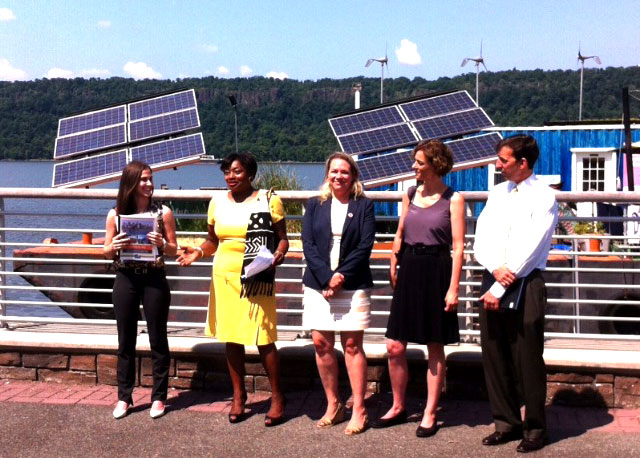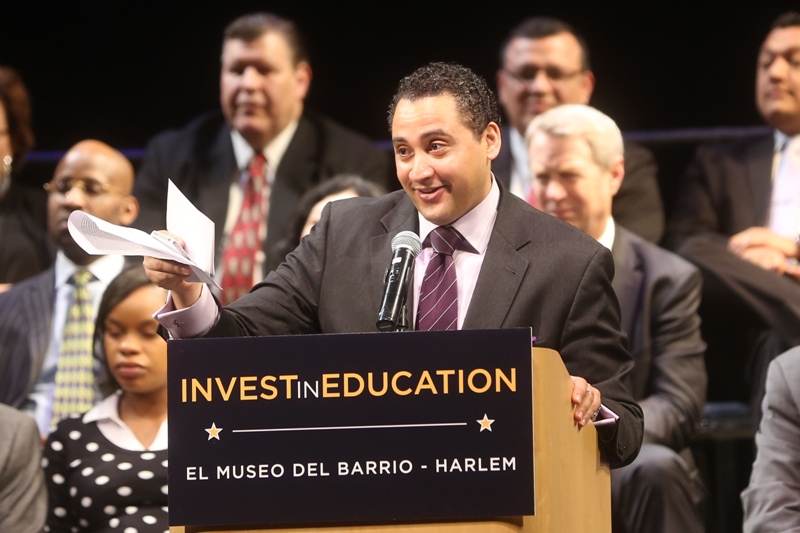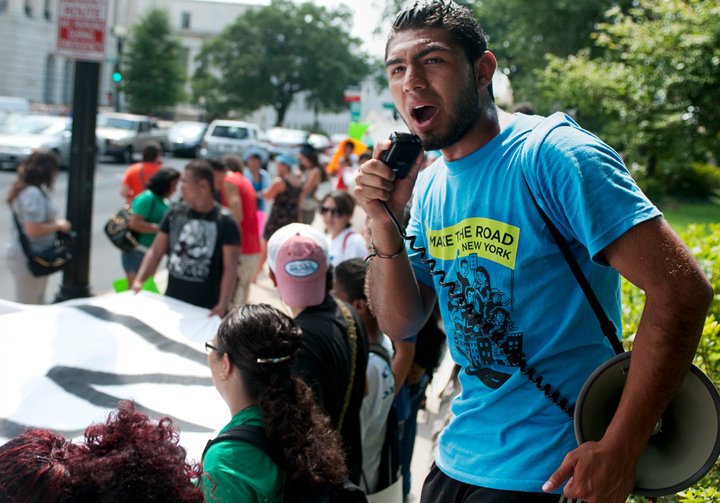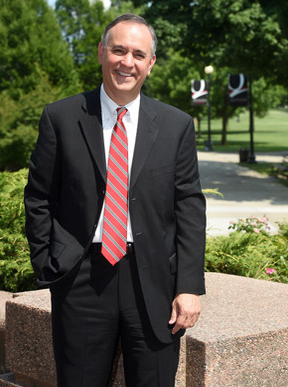Sky’s the Limit for Solar in New York

The author, far left, & others at a solar panel event
Fifteen years ago, flat-screen televisions were a rare luxury item, a smart phone was one with an address book, we kept our music on plastic discs, and video chats were a feature in Star Trek episodes. Now there's widespread use of handheld devices that enable us to listen to music, watch videos, talk, text or video-chat with friends or colleagues, while also providing immediate access to a world of information.
Times have changed, and solar power is a case in point. Fifteen years ago, solar was used by a small number of true believers. Now, because of advances in technology and growing economies of scale, solar costs 25 percent of what it cost in 2000.
Solar panels are popping up all over: on homes, businesses, places of worship, and government buildings. Just over two months ago, in his State of the Union address, President Obama summed it up when he said, "Every three weeks, we bring as much solar online as we did in all of 2008."
Here in New York, solar energy grew 63 percent per year between 2010 and 2013. That's fast enough to reach a goal of 20 percent solar in New York by 2025– a goal once thought ambitious, if not impossible, but now readily achievable.
"Star Power: the Growing Role of Solar Energy in New York," a recent report by Environment New York Research & Policy Center, shows that growth could actually slow down to 47 percent and solar energy would still provide 20 percent of our power in the next decade.
This is a critical finding at a time when state regulators are trying to transform the New York's energy efficiency and renewable energy programs through Governor Cuomo's "Reforming the Energy Vision" (REV) initiative.
Boosting solar energy power production is more urgent than ever. Scientists have never been clearer that global warming is real, happening now, and will only get worse without meaningful action. In New York, we're already feeling consequences like Hurricane Sandy and other more extreme weather.
Achieving 20 percent solar energy would cut as much carbon pollution as 3 million cars emit in a year, and put New York more than halfway to the benchmark set by the U.S. Environmental Protection Agency's Clean Power Plan, which requires cuts in power plant carbon pollution of 44 percent.
More solar isn't just good for the environment. It's also good for our economy. Solar is currently the fastest-growing industry in the country, adding 143,000 jobs nationwide in 2013. According to the latest solar jobs census from the Solar Foundation, the solar industry employed more than 7,000 people in New York last year.
Of course, 20 percent solar is just a sliver of the possible. The state is home to more than 1.9 million residential and commercial rooftops that could host solar panels, and it has enough technical potential to meet the state's energy needs 11 times over.
We've made progress. But we can't take that progress for granted. Powerful interests, including the fossil fuel industry and electric utilities are working hard to slow gains. To take solar to the next level, we'll need a strong commitment from our local, state, and national leaders. By adopting a goal of getting 20 percent of our power from the sun by 2025 and working together, we can begin to move New York and the nation toward a future where we get all of our power from pollution-free energy sources. Our quality of life and our children's future depend on it.
***
Heather Leibowitz, Esq. is the Director of Environment New York, a statewide environmental advocacy organization.
***
Have an op-ed idea or submission for Gotham Gazette? E-mail editor Ben Max: This email address is being protected from spambots. You need JavaScript enabled to view it.
Education Isn't Either/Or

Assembly Member Rodriguez, the author (photo: investined.org)
Each year education advocates head to Albany to fight for our children, this year was no different as thousands arrived on the steps of the Capitol last week clad with signs, flyers, and banners. Yet, among all the differences, all the arguments they bring to the table, one thing is clear – our children need our help.
There are a bounty of choices for parents: public schools, charter schools, private and parochial schools; I hear the benefits of each and we feel the successes of their graduates in our community. There are a million reasons to choose one over another, but the choice is limited if they don't receive adequate funding to stay open.
There are 143,000 children, the majority of them children of color from low-income neighborhoods, stuck in failing schools that are crippled by a lack of basic resources, including equitable funding. The $1.8 billion increase in school funding put forth by Assembly Speaker Carl Heastie, myself, and my colleagues will fill the Gap Elimination Adjustment and start meeting the $4.9 billion Campaign for Fiscal Equity (CFE) commitment we so badly need to keep schools funded.
It's simple to fix this problem by allocating more money in the budget for schools through tax proposals - we already have a school system that has been hurt by property tax caps. However, dedicating a larger portion of the State's bank settlement funds towards CFE will allow us to make the needed improvements to our schools.
As we fight for what we deserve from the CFE settlement, we must also explore education reforms. Funding and improving our schools must not be an either/or conversation; we should willingly implement reasonable changes that provide the best results for our kids.
First, we must ensure adequate funding for quality pre-Kindergarten programs. Pre-K is integral in identifying and helping special needs students early in the educational process. The ability to detect special needs early will allow parents to work with teachers to identify the best course of action to ensure their child gets the help they need and can potentially eliminate their need to be enrolled in special education (SPED) to begin with.
Second, we need to reevaluate our SPED programs. African-American and Hispanic children are more than twice as likely as their white counterparts to be identified by teachers as having serious learning disabilities, and they are 1.5 times more likely to be funneled into SPED services than all other racial and ethnic groups combined.
In New York City, district schools receive an extra $2,309 to $8,609 per SPED student, and often even this is insufficient. Further, If a school graduates a student out of SPED status and provides only supplemental support, the extra school aid drops to just $500, creating a disincentive for schools to graduate students from SPED. While there are schools, both district and charter, which do serve special needs students, and serve them well, many do not. We should increase special education funding for students who can be in mainstream classrooms but need additional services, eliminating the disincentive to move students out of SPED.
Third, we need to explore what accountability looks like through fair and unbiased evaluations. Our teachers can't be portrayed as villains, they are our greatest ally in ensuring our children get the best education.
Last, where teachers and principals have been found to have committed a violent crime, been involved in misconduct involving the sexual abuse of a student, or found incompetent through a pattern of ineffective teaching, a swift suspension or removal process must be implemented to protect our children. Lengthy processes hurt our schools' abilities to educate our children and thus hold our students back.
As we work toward a budget that includes what is owed us from the CFE lawsuit, we must not ignore the areas where we can learn and enhance the opportunities we provide to our children. Our educators and communities, our teachers, our district schools, our charters, and ultimately, our students, have too much on the line to ignore the necessity for bold action, structural improvements, and needed investments to end our state's failing school crisis.
***
Assembly Member Robert Rodriguez represents East Harlem/El Barrio and the Upper East Side.
***
Have an op-ed idea or submission for Gotham Gazette? E-mail editor Ben Max: This email address is being protected from spambots. You need JavaScript enabled to view it.
New York Colleges Need the DREAM Act

Francisco Curiel, one of the co-authors
Queens College is a special place. As one of the country's most culturally diverse campuses—we serve men and women from more than 150 countries—the college seeks to "prepare students to become leading citizens of an increasingly global society," as our mission statement notes. We pride ourselves on being accessible and offering a rigorous education. In keeping with our motto—"We learn so that we can serve"—we provide an education that will enable our graduates to better serve their communities and the needs of our beloved New York State.
We strive to make Queens College as accessible as possible to all New Yorkers who meet our high admissions criteria. But there is a major roadblock confronting many DREAMers (undocumented immigrant students). The roadblock is that, because of their status, DREAMers are ineligible for financial aid.
All of New York State's colleges and universities would benefit from the passing of the DREAM Act. Its passage would open up the state's Tuition Assistance Program (TAP) to DREAMers who meet TAP's eligibility criteria. We would also be better able to achieve our goal of educating all New Yorkers and putting them on the path to high-skilled employment.
There are three main reasons why the DREAM Act should be passed immediately. First, the DREAM Act would open the doors of educational opportunity to thousands of students who otherwise would be unable to earn a college degree. This would be life changing for these young people and their families. The DREAM Act would also benefit immigrant youth who already are on campus. One of us (Mr. Curiel) is an undocumented youth and a Queens College student who maintains good grades and participates in campus life. However, he has no access to state-funded financial aid, which means significant financial strain on his family, as it does on thousands of other New York families.
Second, the DREAM Act could further advance academic excellence on our campuses. Numerous studies show that all students benefit when they are part of a diverse student body. Queens College students benefit from the rich exchange of ideas and experience that occurs in our classrooms, cafeterias, and common spaces among students from different backgrounds—whether those be national origin, race, culture, ethnicity, or sexual orientation. Having more DREAMers on our campuses would further invigorate classroom discussions and campus life, benefiting DREAMers and non-DREAMers alike. It could also help DREAMers feel more comfortable on campus by eliminating the arbitrary barrier that immigration status can sometimes impose.
And third, the DREAM Act would enable us to fulfill our mission of educating all New Yorkers and developing a skilled workforce grounded in a liberal arts and science education. In today's global economy, it is essential that we develop an educated workforce to keep New York State ahead of its competition. To do this, we must ensure that every qualified young person who wants to go to college can do so.

Queens College President Matos Rodriguez
A report by the Office of the State Comptroller (OSC) found in 2014 that "the short-term costs of extending financial assistance to undocumented students would be outweighed by the long-term economic benefits." Having more DREAMers in our colleges would significantly increase the ranks of high-skilled workers contributing to our state economy. It would also strengthen our state's tax base, as the OSC found that "a person earning a bachelor's degree would pay more than $60,000 in additional State taxes, compared with a maximum TAP award of $20,000."
In short, the DREAM Act makes sense on three fronts: expanding educational access to New York's youth, enriching our campus life, and benefiting our state economically and socially.
The only challenge now is the willingness to act. By passing the DREAM Act, New York State would be standing up for its talented immigrant youth. It also would be standing up for the continued excellence and vibrancy of our higher education institutions. These are goals we can all support.
****
by Félix V. Matos Rodríguez and Francisco Curiel. Matos Rodríguez is the President of Queens College; Curiel is a Queens College student and a Youth Power Project member of Make the Road New York.
***
Have an op-ed idea or submission for Gotham Gazette? E-mail editor Ben Max: This email address is being protected from spambots. You need JavaScript enabled to view it.




